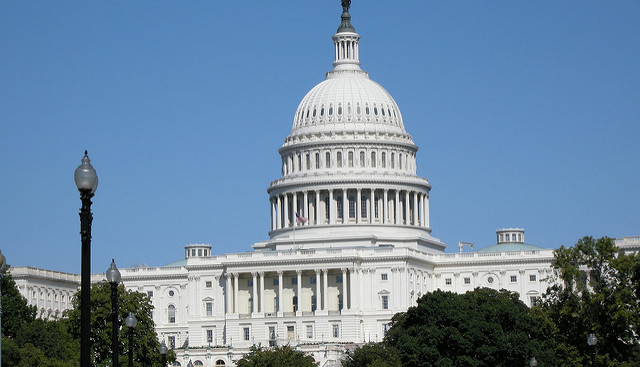
Congress is expected to vote this week on H.R. 1, a sweeping piece of legislation that will consolidate political power on the left and threaten our electoral integrity.
ATR urges a NO vote on H.R. 1
Since regaining control of the House of Representatives in November, Democrats have made it clear that they intend to leverage their newfound power to permanently alter American institutions to benefit themselves and their allies.
Their first major bill, H.R. 1, will fundamentally transform how elections are conducted in the U.S., politicize the historically bipartisan Federal Elections Commission, and suppress political speech for American citizens. Instead of the “For the People Act of 2019,” the bill should be called the “Democrat Political Protection Act of 2019.”
Click here to read ATR’s full letter on H.R. 1.
H.R. 1 Fundamentally Transforms How Elections are Conducted in the U.S.
- The legislation implements a 600% match for certain political contributions to congressional and presidential candidates forcing taxpayers to subsidize political campaigns – even campaigns that they may disagree with. Under the provision, any individual that donates under $200 to a candidate or PAC is entitled to a $6 match to every dollar donated. In order to qualify for the match, a candidate must raise $50,000 in small-dollar donations or have at least 1,000 small-dollar donors.
- Provisions like this have been abused in the past. An Arizona Congressional candidate took over $100,000 in public match funds and spent it on nightclubs, vehicle rentals, and restaurants. Instead of returning the entirety of the funds he stole, he only had to return $15,000.
- In New York City, former city council member Sheldon Leffler was convicted of attempting to break up a $10,000 donation to take advantage of NYC’s public matching program. Similarly, a city council candidate was convicted of spending $17, 223 in public matching funds for personal expenses like groceries, restaurants, and gas.
- If H.R. 1 became law, the federal government would force states to implement early voting, automatic voter registration, same-day registration, online voter registration, and no-fault absentee balloting.
- The bill would invalidate voter identification laws all across the country by allowing voters to simply sign a statement affirming their identity as they enter their polling place. These massive changes infringe on states’ rights and threaten the integrity of our election process.
- Article I Section IV of the Constitution clearly gives state legislatures the primary responsibility for — quote — the “times, places, and manner of holding elections for Senators and Representatives.” This is a blatant power grab by Democrats to rewrite election laws to benefit themselves and their friends.
H.R. 1 Politicizes the Federal Elections Commission
- This legislation politicizes the historically non-partisan Federal Elections Commission (FEC), transforming it from a six-member bipartisan committee to a five-member committee.
- Currently, the FEC is comprised of three Democrats and three Republicans and needs four votes to move forward with any prosecution of alleged campaign violations or investigations.
- If H.R. 1 were implemented, the panel would contain two Democrats, two Republicans, and an “independent” from a minor political party. Three votes would be required to move forward on any matter. Under this rule, a president could appoint a Bernie Sanders-style “independent” to serve as the fifth member of the FEC.
- H.R. 1 takes a step further in politicizing the FEC by allowing the president to unilaterally pick the FEC Chairman and abolishing the longstanding requirement that the Chair and Vice-Chair be from different parties. The legislation also expands the Chair’s power over the committee, allowing him to issue subpoenas, compel testimony, and control the FEC budget without consulting the rest of the commission.
H.R. 1 Suppresses Freedom of Speech
- The legislation would stifle free speech through new donor identification requirements. If implemented, organizations that make “campaign-related disbursements” totaling more than $10,000 during a two-year period would have to publicly identify the donors that gave over $10,000 during that period.
- The legislation continues to chip away at free speech by inventing a new regulation called “PASO,” an overbroad standard that asks whether political speech “promotes,” “attacks,” “supports,” or “opposes” a candidate or official. This vague standard is open to broad interpretation by the ruling party and is a clear tool for political targeting.
- In a further attack on free speech, H.R. 1 undoes the FEC’s “internet exemption” which excludes the internet from regulation of political speech. Essentially, if the FEC deems that online communication is “paid,” it is fair game for the same regulations and donor disclosure requirements as traditional advertisements.
- This even includes any communication any organization makes on social media platforms like Twitter and Facebook, including paid staffers managing the platforms.
- This provision implements a “public file” requirement for any person or organization spending over $500 in a calendar year, forcing them to identify the name, address, and contact information of ad sponsors that are not candidates or with the campaign.
- The bill expands the “stand by your ad” disclaimer in video advertisements, forcing organizations to identify their top five donors at the end of advertisements. This is a clear infringement on the First Amendment rights of all Americans to engage in political speech without fear of retaliation from those who disagree.
- While the bill makes a lot of references to Super PACs and dark money, it is clear that these provisions will affect the free speech rights of everyday Americans looking to engage in the political process.
Taken as a whole, H.R. 1 is an unconstitutional bill that federalizes the elections process, politicizes the FEC, and suppresses freedom of speech. Congress should reject this legislation.

